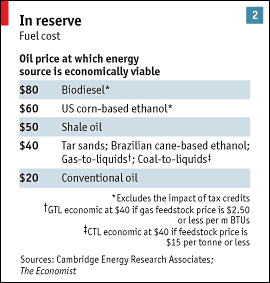Monday, May 08, 2006
More on Bio-Fuels
I have been making several posts in the last month on alternative fuels and energy. As crude oil prices shoot through the roof, this space becomes more and more attractive. Specifically, I have been following Vinod Khosla's interest in the space, including his investment in Praj. Khosla has clearly become the leading proponent of bio-fuels in the United States and his op-ed today in the New York Times, with ex-senator Tom Daschle, is yet another example of his advocacy for bio-fuels.
That said, here are sobering statistics from CERA, courtesy of The Economist.

No, it doesn't look that good, does it? Well, as the fine print says, the cost of bio-diesel in there does not take into account tax credits and subsidies, which you can almost automatically assume when it comes to bio-fuels. And I suspect that the initial subsidy (land, water, power etc) will allow the business to scale to a point where the business becomes truly attractive. The question then is what OPEC will do, because if they can drop the prices to $30 a barrel, bio-fuels are a non-starter. However, I somehow suspect oil prices aren't going below $50 ever again because if OPEC could drop prices, they would have before the idea of bio-fuels got so much currency.
The CAFE standard does nothing to encourage that change. It requires American automakers to build cars and trucks that meet a minimum standard of average mileage traveled per gallon of gasoline. But the current standard for minimum mileage traveled per gallon of gas consumed is both too low and focused on the wrong challenge. We need to upgrade to a new CAFE: Carbon Alternative Fuel Equivalent. This new CAFE will measure "petroleum mileage" and give automakers incentives and credits for increasing ethanol consumption as a percentage of fuel use of their vehicles, not least by promoting flex-fuel vehicles, which can run on either gasoline or E85 fuel, a blend of 85 percent ethanol and 15 percent gasoline. This approach promises several significant benefits.
First, it could set America free from its dependence on foreign oil. As Brazil's "energy independence miracle" proves, an aggressive strategy of investing in petroleum substitutes like ethanol can end dependence on imported oil. Second, switching from gasoline to ethanol produced from perennial energy crops like switch grass can slash our carbon dioxide emissions. Third, it could build on a comparative advantage of American automakers. American auto manufacturers are churning out hundreds of thousands of flex-fuel vehicles. Their foreign competitors make far fewer. Promoting these vehicles will help our automakers build on their already strong market share. And fourth, by encouraging the production of ethanol and new renewable fuel technologies, this new CAFE standard could invigorate rural communities in America's heartland and innovation and research centers along its coasts.
That said, here are sobering statistics from CERA, courtesy of The Economist.

No, it doesn't look that good, does it? Well, as the fine print says, the cost of bio-diesel in there does not take into account tax credits and subsidies, which you can almost automatically assume when it comes to bio-fuels. And I suspect that the initial subsidy (land, water, power etc) will allow the business to scale to a point where the business becomes truly attractive. The question then is what OPEC will do, because if they can drop the prices to $30 a barrel, bio-fuels are a non-starter. However, I somehow suspect oil prices aren't going below $50 ever again because if OPEC could drop prices, they would have before the idea of bio-fuels got so much currency.